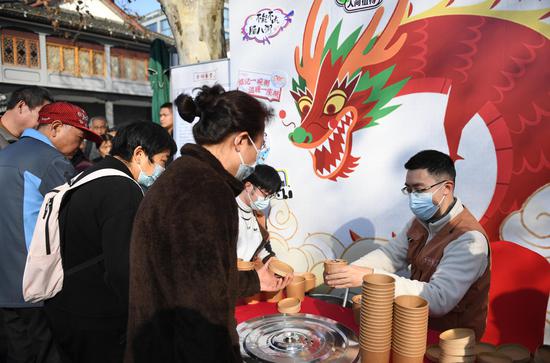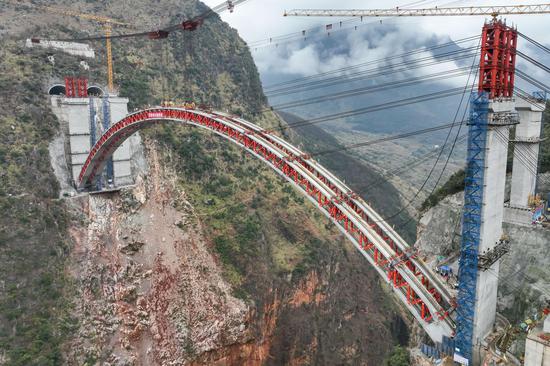Chinese researchers published on Thursday oral accounts by survivors of a terrorist attack that occurred in the Xinjiang Uygur autonomous region 12 years ago, turning the spotlight on a group of people who they say have long been understudied by scholars and have remained hidden from the public eye.
The report, titled "Victims and Survivors of Terrorism in China: An Oral History", was released at a seminar held at Jinan University in Guangzhou, Guangdong province. It reveals the harrowing experiences of those who lived through the atrocities that took place on a pedestrian street in southern Xinjiang's Yecheng county on Feb 28, 2012.
Nine terrorists, who failed to execute their original plan that involved attacking students of nearby elementary and middle schools, went on a killing spree on Xingfu Road that evening, leaving 13 people dead and 16 injured on the spot, most of them passers-by or shopkeepers. Two victims later died in a hospital.
Local authorities quickly swung into action. Seven terrorists were shot dead, one was fatally wounded and one was arrested.
Zheng Liang, lead author of the report and director of the university's Institute for Communication and Borderland Governance, said the document was the first of its kind in China and was aimed at shedding light on terror attack survivors who have so far received little or no attention from academia and the media.
Studies on terrorist attacks in China have mostly focused on the perpetrators in the past, he said, adding that it was high time that survivors who grapple with lifelong trauma receive the attention they deserve.
"They are also heroes, unsung heroes," Zheng said. "They refused to be beaten down. They tried to stand up again. They tried to carry on with their lives."
Tursun Talip, who lost his son Turghunjan, an auxiliary police officer, in the attack, was among the six people — survivors of the attack or relatives of the victims — interviewed for the report.
The 68-year-old, then an employee of the local education bureau, was working at a school that was among the original targets. He received a phone call warning him of the impending attack. He was told to inform the security staff and close the school gate.
"I learned something had happened at the market's entrance (on Xingfu Road)," Tursun Talip said during his interview with the researchers in July 2022. "My heart skipped a beat as I realized that my son was on duty there."
He hopped onto a motorbike and raced to the scene of the attack, but by the time he reached there, his worst nightmare had come true. Police escorted him to a hospital. After waiting anxiously for hours, he was informed that his son was dead, and he needed to identify the body.
"I saw the wounds on my son's neck, and here (shoulder and neck), and there (right arm)," Tursun Talip said.
The report published on Thursday was part of a project formally launched by the researchers in 2021 to catalog stories told by survivors of terrorist attacks in China.
"Starting in 2020, I have used my personal connections to find these people," Zheng said. "We locate one person, and through that particular person we eventually meet more. In academic parlance, it is called snowball sampling."
He said the team interviewed more than 60 survivors over the past three years, and amassed more than 1 million Chinese characters of transcripts and 90 hours of audio and video clips.
The researchers also cross-referenced their stories to ensure the accuracy of the accounts, given that the events happened more than a decade ago and many survivors had tried to leave their traumatic experiences behind.
Challenging task
Zheng said the task of compiling the report had not only been physically challenging — the interviewees were scattered across Xinjiang, which accounts for about one-fifth of China's territory — but also psychologically difficult.
"They walked us through their traumatic experiences, and we actually felt their pain and agony, and their unwillingness to accept the fact that they've lost their loved ones," he said. "They said they couldn't sleep at night, because when they closed their eyes, they saw their loved ones."
The members of the research team suffered a certain degree of trauma themselves from hearing all these stories over and over again, he added.
The report will help the Chinese people and the world better understand what happened to the survivors of the Xinjiang terrorist attack more than a decade ago, and it will also help them understand China's counterterrorism efforts, according to Zheng.
The Chinese approach to counterterrorism is tackling the root cause, he said, adding that the approach is multifaceted, ranging from antipoverty efforts to projects aimed at creating local jobs and promoting schooling for young children.
Speaking at the seminar virtually, Ma Dazheng, a borderland governance researcher at the Chinese Academy of Social Sciences, said that history must not be forgotten as these stories can help people stay vigilant.
He said the accounts of atrocities will deal a heavy blow to those external forces seeking to smear Chinese counterterrorism efforts. "The evil nature of such attacks must be fully explained to the public," he said.
In its foreword, the report said that Zheng's project will continue to seek out eyewitnesses and survivors of terrorist attacks nationwide, focusing on their experiences and stories. It also welcomed more witnesses to share their stories by contacting o_icbg@jnu.edu.cn.


















































 京公网安备 11010202009201号
京公网安备 11010202009201号